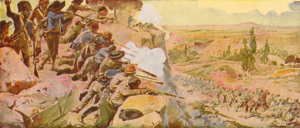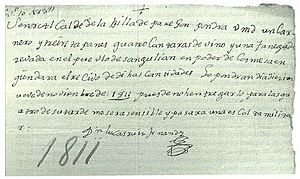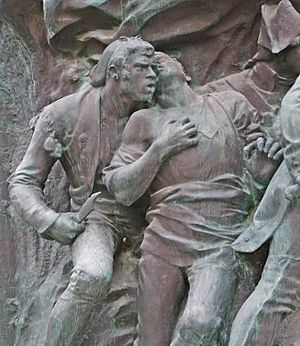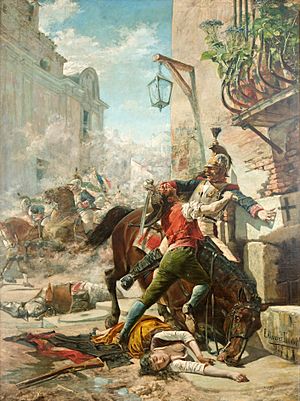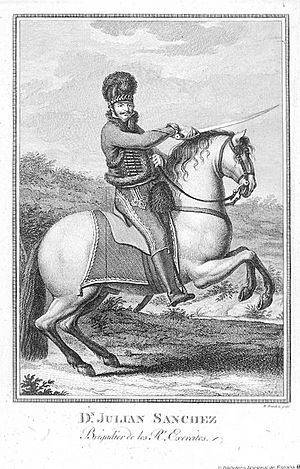Guerrilla warfare in the Peninsular War facts for kids
Guerrilla warfare in the Peninsular War was when ordinary people, not regular soldiers, fought against Napoleon's huge French army in Spain and Portugal. This happened during the Peninsular War (1807-1814).
These brave fighters were a constant problem for the French army. A Prussian officer fighting for the French once said, "Wherever we arrived, they disappeared, whenever we left, they arrived — they were everywhere and nowhere."
The Peninsular War was very important because it was the first time guerrilla warfare was used on such a large scale in Europe. Because of these guerrillas, Napoleon's troops were not only defeated in Spain and Portugal, but they were also stuck there. This meant they couldn't fight in other parts of Europe. The constant trouble caused by the guerrillas made Napoleon call the conflict the "Spanish Ulcer."
How the War Unfolded
Even though the French army often won big battles, the guerrillas made it very difficult for them. For example, at the Battle of Bailén, a surprise victory for the Spanish, guerrilla actions between Madrid and Andalusia played a part. This victory helped convince the British that Napoleon could be beaten.
By 1812, there were about 38,520 irregular troops in Spain alone, divided into 22 different guerrilla groups.
Local groups of fighters had existed before in Portugal (called ordenanças) and Spain (like the miquelets and somatenes in Catalonia and Valencia). These groups had proven their worth in earlier wars. But during the Peninsular War, which Spaniards called the War of Independence, these armed groups became active all over the country. They even worked alongside regular army units.
The Spanish government, known as the Junta Central Suprema, saw how successful these fighters were. So, on December 28, 1808, they issued a rule called the Reglamento de partidas y Cuadrillas. This rule officially allowed guerrilla groups to form. Later, in 1809, new rules allowed these "Land Corsairs" to keep any money, supplies, or equipment they took from the French. Sometimes, this meant they were seen as little more than bandits by both the French and even some local people. However, over time, many of these groups joined the regular Spanish Army, and their leaders were given military ranks.
Spanish guerrillas often attacked the French army's supply lines and communication routes. These guerrillas were mostly ordinary civilians, often from rural areas. Their success came from needing only a few people and simple equipment to control a large area and disrupt French movements. Even though the French won many traditional battles, they couldn't win against this type of unconventional warfare. The constant stress from the guerrillas greatly frustrated Napoleon.
By the end of 1809, the damage caused by the guerrillas was so great that a special Dutch Brigade was sent to fight them in La Mancha. However, they were largely unsuccessful.
Important Actions
- Battle of Arlabán (1811): A Spanish guerrilla force, led by Francisco Espoz y Mina, ambushed a French convoy. They captured 150 wagons and freed 1,042 British, Portuguese, and Spanish prisoners. The convoy was worth a lot of money!
- Battle of Puente Sanpayo (1809): The French army, led by Marshal Michel Ney, was defeated by the Spanish army. As Ney's troops retreated, they were constantly attacked by guerrilla forces, which caused even more casualties.
Famous Guerrilla Leaders
Local stories often made these leaders seem like heroes. Many of the main guerrilleros were actually officers from the regular army who led these irregular groups. Some of the well-known ones include:
- Francisco Abad Moreno, "Chaleco"
- Agustina de Aragón
- Francisco Espoz y Mina
- Francisco Sánchez Fernández, "Tío Camuñas"
- Joaquín Ibáñez, Baron de Eroles
- Francisco de Longa
- Juan Martín Díez, "El Empecinado"
- Julián Sánchez García, "el Charro"
- Jerónimo Merino, "el Cura Merino"
- Martin Xavier Mina
- Tomás de Zumalacárregui
See also
 In Spanish: Guerra de guerrillas en la península ibérica durante las guerras napoleónicas para niños
In Spanish: Guerra de guerrillas en la península ibérica durante las guerras napoleónicas para niños
- List of Spanish general officers (Peninsular War)
 | Roy Wilkins |
 | John Lewis |
 | Linda Carol Brown |


